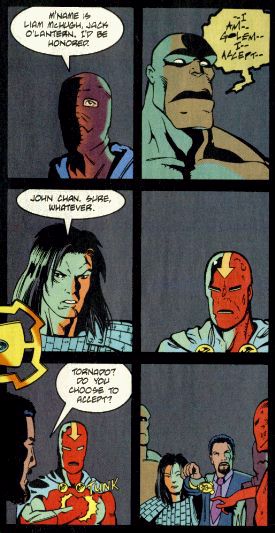Primal Force

 Of the new books announced to debut after Zero Hour, the only two I was sure I’d bother with were Starman and Primal Force. If it were up to me, those would be the two I’d still be reading. But Primal Force was cancelled, for the usual reasons. This fact and the poor sales of Seagle’s small-press mini-series Solstice put him on my list of Under-Appreciated Creators.
Of the new books announced to debut after Zero Hour, the only two I was sure I’d bother with were Starman and Primal Force. If it were up to me, those would be the two I’d still be reading. But Primal Force was cancelled, for the usual reasons. This fact and the poor sales of Seagle’s small-press mini-series Solstice put him on my list of Under-Appreciated Creators.
 In the first issue, Seagle brought together a handful of characters from the fringes of the DCU (plus one new character) to serve as the front-line defence against the weirder dangers of that world. Each of them was an enigma or a blank slate, and the exact nature of what this team would be doing was a bit of a mystery. But Seagle gradually explained who the characters were, and slowly built them into a real team.
In the first issue, Seagle brought together a handful of characters from the fringes of the DCU (plus one new character) to serve as the front-line defence against the weirder dangers of that world. Each of them was an enigma or a blank slate, and the exact nature of what this team would be doing was a bit of a mystery. But Seagle gradually explained who the characters were, and slowly built them into a real team.
As you might expect from a set of diverse characters thrown together by the gods (i.e. the writer and editor), there was plenty of tension and friction among the characters, and it took them a little time to get used to each other, learn to trust each other, and to grow to care for each other. And even then, they didn’t magically become the Super Friends. But neither did they become the X-Men. They interacted like real people (or whatever they were) might.
My favorite character was Jack O’Lantern, one of the corniest-sounding heroes DC has ever trademarked. Because of this, the events of #6 (I give no spoilers) were enough to make me consider dropping the book. Seagle got me back (with a commitment to stay) with #7. The lack of a real big-name star (the hero formerly known as Red Tornado was the most famous) probably hurt sales; it was part of the appeal to me.
Some people complained that the book was moving too slowly. Perhaps in response to this, Seagle took a bit of a jump in #7, fast-forwarding development of the plot, team, and characters. It was an interesting dramatic device, but didn’t really satisfy me; I wanted to see things develop naturally, even if it took a while. It’s not like this was a limited series that had to be wrapped up within a year. (It actually got to continue for three months more than a year.)
One thing that intrigued me about the series were the changes. Seagle kept changing the structure of the team, remolding various characters (sometimes literally), and kept me guessing where it would go next. Not only did I look forward to the next issue, I wondered about it.
The ending was a bit abrupt (even more so than most cancelled titles). A few new characters had just come on board, and we didn’t even get to learn all of their names. There was a clumsy tie-in to the then-current Big Event (Underworld Unleashed), culminating in a Big Fight Scene. Seagle really didn’t even tell how it ended. But given the choice between more Big Fight, and the thoughtful reflection that Seagle instead put in the last six pages, I’ll take the latter any day.
It’s not often that a cancelled book ends on such a positive note.
